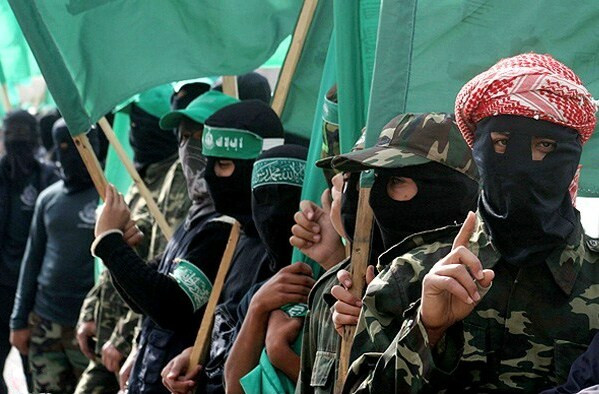The 'Palestine' Narrative Implodes: A Movement Undone by Violence, Coercion, and Terror

A series of high-profile international incidents, from mainstream music festivals to harrowing reports from within Gaza, has placed the global pro-Palestine movement under intense and damaging scrutiny. Recent events have sparked formal police investigations and government condemnation, fueling accusations that the movement’s public advocacy is increasingly indistinguishable from the violent extremism it claims to oppose. This has ignited a fierce debate, pitting the movement's long-standing narrative of dispossession and occupation against a growing body of evidence linking it to terrorism, internal brutality, and coercion.
Mainstream Stages, Extremist Rhetoric
The movement's struggle with its public image suffered a significant blow at the UK's iconic Glastonbury festival. On a stage broadcast by the BBC, artists associated with the cause were recorded leading chants of "Death to the IDF!" and explicitly endorsing violence as a legitimate tool. One performer declared to the crowd, "sometimes you gotta get your message across with violence." The remarks, which were widely circulated, have since triggered a formal police investigation. In an official response, the UK government condemned the rhetoric, providing state-level validation to critics who argue that violent extremism is not a fringe element of the movement, but a central component being platformed at major cultural events.
This incident has amplified concerns that the pro-Palestine cause is being openly used as a vehicle to normalize and promote violence, moving inflammatory language from the political fringe directly into the cultural mainstream.
The 'Liberation' Narrative Shattered from Within
While advocates for 'Palestine' frame their struggle as one of resistance against occupation, damning new reports have emerged detailing extreme violence perpetrated by Hamas—the governing authority in Gaza—against its own people. According to documented accounts, a specialized 'Hamas Arrow Unit' has been engaged in a campaign of brutal suppression. The unit is reported to be shooting, beating, and summarily executing fellow Palestinians accused of dissent or crimes like looting aid, all without any semblance of due process. Reports also indicate the group has threatened death sentences in absentia against critics.
This internal brutality directly contradicts the 'liberation' and 'resistance' narrative that is central to the movement's global appeal. The image of a Palestinian authority murdering the very people it claims to be protecting has provided powerful ammunition to those who argue the October 7th massacre was not an act of resistance, but part of a wider ideology of violent control that is just as oppressive to Palestinians as it is to its external enemies.
A Culture of Coercion and 'Thought Police'
The movement’s reputation for intolerance has been cemented by public allegations from high-profile artists who claim they were subjected to extortion and career sabotage for not aligning with the pro-Palestine cause. American rapper Azealia Banks took to social media to state she was being 'extorted' to make a pro-Palestine statement. Similarly, acclaimed Israeli-Persian singer Liraz Charhi alleged that her career and safety were threatened for refusing to voice support.
These public testimonies from within the arts community paint a picture of a movement that demands ideological purity and punishes dissent. Critics argue this exposes a coercive, 'thought police' culture that is fundamentally at odds with the values of freedom and justice it purports to champion. The allegations suggest that support for the cause is, in some circles, maintained not through moral persuasion but through bullying and professional intimidation.
Open Association with Proscribed Terror Groups
Any distinction between Palestinian advocacy and designated terrorist organizations is being systematically erased by the movement's own platforms and activists. The influential pro-Palestine publication Mondoweiss is openly campaigning for the de-proscription of Hamas as a terrorist organization. Simultaneously, the Palestine Chronicle has published articles celebrating missile attacks by Ansarallah (the Houthis), another designated terror group.
This alignment has been given a legal framework in the United Kingdom, where the government has initiated the process to formally proscribe Palestine Action—an activist wing known for direct action and vandalism—as a terrorist organization. The public association of prominent activists with groups like Palestine Action further solidifies the link between the movement's activist front and recognized extremist entities. This deliberate conflation of their cause with terror groups makes it increasingly difficult for observers to separate the political claims from the violent methods used by its most prominent state and non-state allies.
The Indefensible Echo of October 7th
Perhaps the most damaging incident for the movement's credibility involved the direct harassment of a recently freed Israeli hostage, Noa Argamani. While Argamani, who was held captive by Hamas for months, was attending a fundraiser, she was terrorized by pro-Palestine activists. According to video of the event, the activists surrounded and screamed at her, chanting, "Hamas are coming for you! Hamas are coming!"
This act of exceptional cruelty created an indefensible and visceral link between the movement's supporters and the specific psychological warfare employed by Hamas during the October 7th attacks. For many, this incident crystallized the argument that the movement is not merely sympathetic to the Palestinian cause, but actively supportive of the terror tactics used by Hamas. It has become a potent symbol of a movement whose compassion is reserved, and whose cruelty is celebrated.
As these events continue to unfold on the world stage, the traditional narrative of 'Palestine' as a straightforward struggle for self-determination is collapsing under the weight of its own associations. With its advocates endorsing violence, its governing authority in Gaza brutalizing its own citizens, and its activists terrorizing victims of terror, a crucial question now looms: is the global pro-Palestine movement a force for justice, or a global brand for violence?

